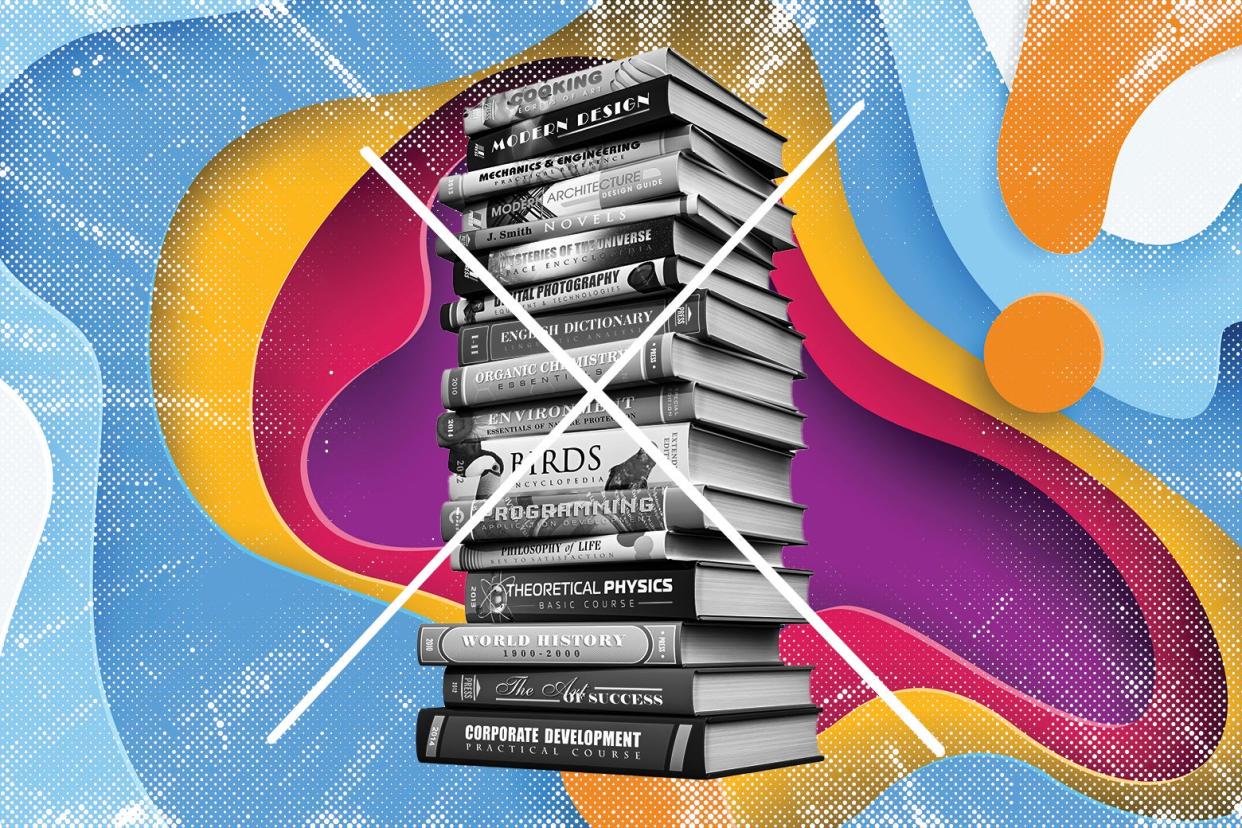Get Rid of Your Books! Really!

This is One Thing, a column with tips on how to live.
I approved the headline, so I get why you’re mad. But bear with me a second.
I love books. I love the smell of them, the weight of them in my hand, the appearance of their
spines all lined up on a shelf. I love walking down the aisles of a library, perusing pages at my
local indie, and of course—above all else—I love reading them. I love reading them so much that I studied literature in college and then, still unsated, I went on to become a professional writer.
I say all this so you’ll understand: I’m not baiting you for fun. I know it won’t be easy. But my
advice still stands: You should get rid of your books.
O tempora! O mores! O whatever. I’m not different from you. All bibliophiles grow up wishing for an immense library. If you’re a millennial, like me, you probably imagined it’d be something like Belle’s in Beauty and the Beast, all floor-to-ceiling-bookcases and a rolling ladder with which to zip around them. But you don’t live in a French Rococo palace, do you? No. More likely, you’re forced to do geometry each time you move (and you move a lot), agonizing over where to unpack yet another box of books, wondering if it’s absurd to tuck some atop the fridge, asking yourself how often you really use your oven anyway. If you’re a millennial and you own a house, congratulations on winning our generation’s lottery—but I’m betting it’s smaller than you might have hoped, and that your home-office-slash-guest-room-slash-baby-nursery could use some of that square footage gobbled by bibliotheca.
I’m not advocating you have no books. Everyone should have a permanent collection (and you even have my permission to call it such, if you’d like to feel fancy). But be realistic about your space and realistic about which titles have earned a place there, because your shelves won’t expand just because you willed them to. Of course, some books are too special to give up, regardless of how often you read them: There’s a first-edition T.S. Eliot from my favorite boyfriend, which will always keep a place on my shelf, and I reread Moby-Dick’s “The Sermon” every Yom Kippur in lieu of synagogue, so that’s not getting evicted. If it’s a book you’ll reference regularly, or reread often, or just one that you’ve supplied with urgent emotional attachment—keep it. The rest of the books? Give them away.
After the culling, you should continue to buy new books, whether they’re preorders of favorite authors or secondhand treasures scored on a whim. But when you’re done with them, you must commit to passing them on—to friends, to neighbors, to Little Free Libraries, to donation piles at schools. And yes, library loans and e-books (which simply return to the ether) fit the central thesis: Books should be read, then shown the door. And if something new does go into the permanent collection, something goes out.
I understand why it might be hard to pauperize your current collection. For one, there’s ego: After all, each book is a physical testament to your scholarly capability, a paper trophy to your great intelligence. And of course, the specific titles lend further context to that great intelligence: The Nora Ephrons prove you’re a romantic, but the Stephen Kings hint that you’ve got some darkness. Each one is meticulously selected and placed, a little starter pack on Who You Are™. We imbue so much value on book ownership that John Waters even advocates a sex shun against anyone who lacks an adequate collection.
But what if, in this quest to declutter, we think about our physical books not as baubles with which to impress potential mates, but as a way to exist in, and relate to, the world. When you give a book away, you have given it the opportunity to befriend a stranger. You’ve given it the opportunity to dazzle, to dismay, to make an impression. And no, you’ll probably never cross paths with that book again. Even a loan will not find its way home to you. But if you’re lucky, some years from now, you may hear someone mention a scene, or allude to a plot, or even misquote a passage, and you will recognize the spirit of your old friend, even outside its corporeal form: “I read that once, a long time ago,” you’ll say. You’ll say, “I loved it, too.”

